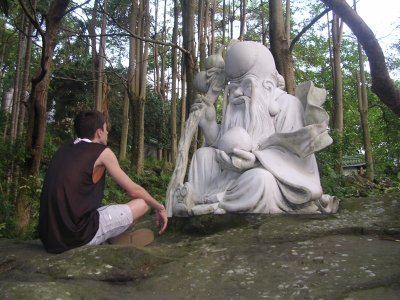Excerpted from Learn How to Meditate by William Bodri
Everyone is looking for a way to still their thoughts, shed their worries, and attain mental peace. That is the purpose of meditation…
There are all sorts of meditations in the world that can help you learn how to cultivate a peaceful mind… They work using different principles of mental pacification, but they all involve teaching you how to detach from the thoughts and impulses in your head (and in your body) that normally bother you, distract you and impel you…
Confucius was actually one of the people who taught the steps of this process in the most detail. He said the first thing to cultivate, when dealing with every facet of life–and not just spiritual or character development–was mental “awareness…”
First you have awareness, then stopping, and then stillness which is almost, but not quite complete. If you keep cultivating this stillness through meditation, it will expand so that you achieve the fourth step of the path, which is a state of true peacefulness…
That’s a state that Eastern sages call “samadhi.” It’s a stage of deep mental quietness or calmness. This is really a state of true quietness and it’s one of the things you are after. It’s a state of spiritual development and a state of human accomplishment. In meditation, you want to reach a state of samadhi or deep mental calming and quiet.
Taking a mental break or mental vacation, and staying in that state of deep, empty calmness with awareness, will also do something else. It will cause all your vital energies to arise in your body. It’s just a natural function of the universe that emptiness, quiet or stillness gives birth to activity (the Chinese say “yin gives birth to yang”)…

Photo Credit: Yug
Modern science has not yet gotten around to investigating this experience, which is commonly reported by many meditators, but only describes the minor effects that meditation produces in the body, such as the following:
- During meditation, oxygen consumption drops by 10 to 20 percent and it produces a deeper state of rest than sleep. In fact, 75 percent of insomniacs were able to sleep normally when they meditated.
- Meditation is the only activity that reduces blood lactate, a marker of stress and anxiety.
- Meditation decreases the stress hormone, cortisol, and increases the calming hormones melatonin and serotonin.
- Meditators secrete more of the youth-related hormone DHEA as they age than nonmeditators…
At first when your vital energies arise because of meditation it will seem as if the bliss-bestowing flow is just a trickle, but eventually so much vital energy will arise that its fullness will give you energy, mental clarity, it will banish depression (because it’s the very antithesis of depression) and the energies that arise will actually transform your physical body…
This result of joy and bliss due to meditation is something that all the spiritual schools commonly mention, including Christianity. In Tibetan esotericism, this experience of peacefulness is called achieving “physical pliancy” or “suppleness,” wherein you achieve a feeling of physical lightness and readiness of high well-being. In Confucianism it’s called “Springtime.” Taoism, yoga, Hinduism and Buddhism describe it differently but they all refer to this phenomena.
When Confucius talks about this state peacefulness or contentment, this actually referred to the Tao school and Esoteric school stage of the opening of all the energy channels (acupuncture meridians) in the physical body due to meditation, which are called “nadi” in India and “chi channels” in Chinese medicine. This is why you can reach a state of perfect physical comfort and well being at this point, which is because the energy channels of the body open due to meditation. That’s what leads to physical healing and mental calm.
When the energy channels open due to meditation, one experiences physical bliss and mental joy and comfort and doesn’t need to rely on drugs or alcohol or other external substances to get those experiences.
Sound mysterious? Shouldn’t be. In every culture that practices meditation as a mainstay of the mental diet, you find the same end results trumpeted over and over again. Science hasn’t caught up yet, but science is behind in a lot of things.
The question is, which type of meditation is best?
For the answer to this and other important meditation questions, download William Bodri’s free e-book, Learn How to Meditate, or read his blog at MeditationExpert.com.
Thanks for all the meditation steps i have to check it out, at home and in my free time, i am sure that it will create a good change in me. thanks again….!
Featured in the Meditation, Yoga and Spiritual Growth Carnival #8.
Informative, to the point; I like your presentation. And I love that picture. What a statue!
Great Post! I’ve always found it hard to meditate but there’s a site I’ve been using that, so far, has been quite good – its a self hypnosis site. Unfortunately you have to pay for membership to use it, but there is a free trial which is quite good. www . dayspaforthemind . com
Yes, I am agree with your posting matter it is absolutely right and informative, It is my request please continue it in future too.